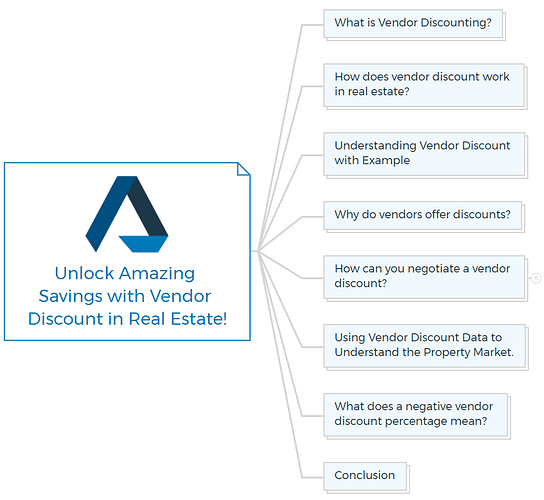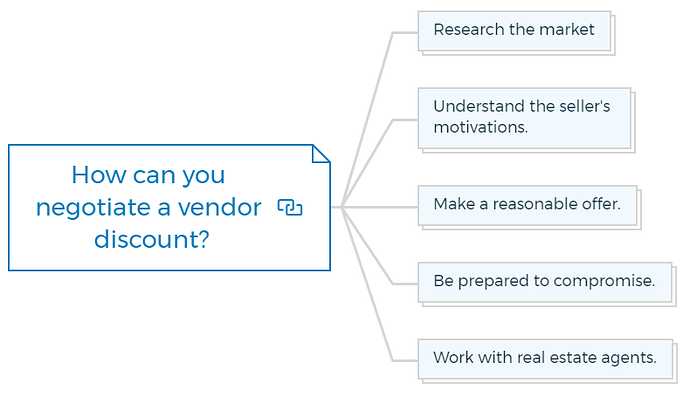What is vendor discounting?
Unlock amazing savings with vendor discount in real estate!
Real estate transactions involve a lot of different costs and expenses, from property taxes to title insurance. One cost buyers can negotiate down is the vendor discount. Vendor discount is another helpful predictive tool in attracting the investors’ minds toward opting for purchasing property or for rental purposes.
Let’s start exploring another crucial stat in the property development system - Vendor Discounting.
What is vendor discounting?
A vendor discount is a reduction in the purchase price of a property that the vendor (seller) offers to the buyer as an incentive to complete the sale.
The vendor will take less money for a faster, easier, or more guaranteed transaction. Vendor discounts can be a percentage off the listing price, a cash rebate, or the inclusion of appliances or fixtures.
How does vendor discount work in real estate?
A seller’s vendor discount in real estate is a percentage off the property’s advertised price. A buyer can buy a $500,000 property for $475,000 if the seller grants a 5% vendor discount.
The vendor discount can be used as a market strategy to attract potential buyers to purchase a property. They can also offer a discount to sell the house quickly, create bidding wars, or attract first-time homeowners.
While a vendor discount can be an attractive opportunity for buyers to save money, they should also consider why the seller is offering the discount.
A high vendor discount could indicate that there are issues with the property, such as repairs or maintenance problems, or that the seller is in a hurry to sell. Before making an offer, purchasers should be sure the property is worth the discount.
Understanding vendor discount with example
Let’s say there is a property that the vendor listed at $700,000. After some negotiation, they provided a 5% vendor discount on it. Now the buying price of the property is $665,000.
Scenario 1
Buyers can save some money with this, but they should also evaluate why the owner is discounting.
If an owner is willing to lower the prices significantly, it evokes a sense that something might be wrong with the property. Either there are few buyers or renters, or the person is in desperate need.
Quick Tip
A higher vendor discount means a decrease in demand or the market has an excessive supply.
Generally, if the rate of vendor discount being offered is greater than 7%, it signifies that buyers have the upper hand. In such situations, sellers bargain the prices and lower the bar from the demanded original price.
Learn More
Scenario 2
The opposite situation occurs when there’s some value attached to that property or the property is in a popular suburb. Vendors refuse to budge from their demanded price if the number of potential buyers is high.
Sometimes this aspect of considering the statistics could be misleading. For instance, the suburb could be overhyped, which implies that the vendor might be demanding a higher price than the properties are worthy of.
On the contrary, this could be a positive sign; if the trend has shifted to a lower percentage of vendor discount being offered, then that indicates that the suburb is gaining value and increasing in demand.
While a high vendor discount could signal issues with the property or low demand in the market, a low vendor discount does not always indicate a better deal.
It’s essential to evaluate the market trends and statistics carefully to make an informed decision on whether a property is worth its asking price.
Learn More
Why do vendors offer discounts?
Vendors may discount their property for many reasons.
- Incentivize a rapid sale. For a quick sale, a seller may accept a lesser price.
- To entice buyers who are unwilling to pay the full asking price. The property may sell better with a vendor discount.’
How can you negotiate a vendor discount?
There are ways to improve your chances of negotiating a real estate vendor discount. Vendor discount negotiation tips:
Research the market
Look at comparable properties, recent sales prices, and local market patterns. This information will help you establish the property’s fair market value and the appropriate discount to ask for.
Understand the seller’s motivations.
Knowing why the seller is selling the home can help you negotiate a better deal. For instance, a seller in a hurry may accept a cheaper price.
Make a reasonable offer.
Make a realistic offer based on your study. The vendor may feel insulted or dismiss your offer if it is too low.
Be prepared to compromise.
Negotiations require compromise. Find a compromise that works for you and the vendor.
Work with real estate agents.
A good agent can negotiate a vendor discount for you. They can offer local market insights, assist you in setting a fair offer price, and negotiate with the seller on your behalf.
Using vendor discount data to understand the property market.
Vendor discounting is an important aspect to consider when investing in real estate. It can tell you a lot about the demand for a particular property and the overall health of the property market.
For example, a vendor discount in a suburb was 9% and started going down to 7 or 6%, which means that more people are buying in that suburb, and that’s why vendors are not interested in giving them credit discounts.
You can understand this concept better in the above video, where I explain the data on the average level of discounting by vendors across Australia.
In 2006 it was 7%, and then people offered around 8% discount, but during the market book in 2010, the vendor discount fell significantly. This data tells about the property market and how it can help you make better property investment decisions.
If a property market is not doing well, a high level of vendor discounting can ring an alarm bell. It suggests that there is a low demand for properties in the area, and vendors are struggling to sell them.
However, a low level of vendor discounting can indicate that the suburb is gaining value and increasing in demand. It can also suggest that the property prices are fair and in line with the market trends.
Learn More
What does a negative vendor discount percentage mean?
A negative vendor discount percentage means that the vendor is charging more than the original asking price.
If a home is listed at $500,000 with a -2% discount, the buyer will pay $510,000. Thus, a negative vendor discount percentage raises the property’s asking price.
Vendors usually provide discounts to compete in a crowded market; therefore, this is rare.
Conclusion
In conclusion, vendor discounting is a useful tool in real estate transactions that can benefit both buyers and sellers. A vendor discount is a reduction in the purchase price of a property that a seller offers to the buyer as an incentive to complete the sale.
Understanding the vendor discount rate, supply and demand equation, and normal sale realistic price can help buyers and sellers make informed decisions about the eventual sale price. Real estate agents can be helpful in negotiating vendor discounts.
Overall, vendor discounting is an important aspect to consider when investing in real estate, and it can tell you a lot about the demand for a particular property and the overall health of the property market.
Test Your Knowledge
Assignment: Understanding Vendor Discounts in Real Estate
Objective:
This assignment aims to deepen your understanding of vendor discounts, their impact on real estate transactions, and how to analyse them effectively. You will engage in market research, critical analysis, and practical application of vendor discounts in real estate scenarios.
Questions & To-Dos:
Definition and Purpose:
- Define a vendor discount and explain its purpose in real estate transactions.
- Why do vendors offer discounts? List at least three reasons.
Case Study Analysis:
- Review the example provided in the article where a property listed at $700,000 is sold with a 5% vendor discount. Calculate the final sale price and discuss what factors buyers should consider when evaluating such a discount.
Market Research:
- Research and find a real estate market in your region or another of interest. Note the average vendor discount rate for the past year. Discuss how this rate affects buyers’ and sellers’ strategies.
Scenario Role-Play:
- In groups, create a role-play scenario involving a real estate negotiation where a vendor discount is critical. One group member will be the seller, the buyer, and another a real estate agent. Demonstrate negotiation techniques to achieve a favourable outcome for your assigned role.
Reflection on Negative Vendor Discounts:
- Explain what a negative vendor discount means and its implications in a real estate transaction. Provide a hypothetical scenario where a negative vendor discount could be beneficial for the seller.
Analysis of Market Trends:
- Based on the concept that a high vendor discount may indicate a buyer’s market and a low or negative discount may indicate a seller’s market, analyse a specific real estate market of your choice. Discuss current trends and predict future movements.
Research Question:
- Investigate how vendor discounts affected the real estate market in two countries during the last financial year. Compare and contrast your findings.
Research Questions:
- How do vendor discounts vary across real estate markets (e.g., residential vs. commercial)?
- What impact have recent economic events had on the levels of vendor discounts in the real estate market?
- How can investors use vendor discount data to make informed decisions about property investments?






